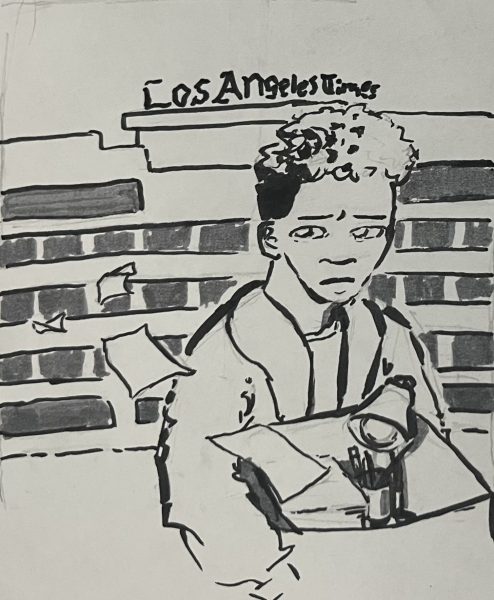The New Morning Tardy Policy Isn’t Benefiting Students
December 17, 2018
The new tardy policy is unfair to students who live far away and it takes away too much class time to go through the process of getting a tardy pass. On Nov. 13 the tardy sweep policy for first period began, which means that if you arrived to school after 7:57 AM, you have to wait in line at the cafeteria and get a tardy slip to even go to class.
The former tardy policy was only for third and fifth period (after nutrition and lunch) and was fair to everyone since students were in school already and had no reason to be late to class. Morning tardy sweeps are unfair to kids that live far away and have to take public transportation. It’s not always their fault for getting to school late. It could be the long distances or the heavy freeway traffic we all dread.
Principal Gabriel Griego said the switch was made because too many students were coming to school late.
“After the bells rings, I stand out in the front and I see anywhere from 100 to 200 students come in after the bell rings,” he said.
When asked about students who live far away, Mr. Griego said, “This may not be the right school for them.”
He added that the policy trains students for punctuality in the working world.
Dean of students, Wayne Lewis, said the policy calls for students to have a 20-minute detention after their third and sixth unexcused tardies. The next set of tardies results in a one-hour detention after school. After that, there may be Saturday school.
“I don’t like going to the cafeteria for a tardy slip because it’s wasting more of my class time,” said Senior Hailey London, who relies on the city bus to get to school.
Teachers have mixed opinions on the new tardy policy.
“It’s a good thing because they should get to school on time, but it’s also a bad thing because they are wasting more class time getting a tardy slip,” said teacher Jaclynne Kroskrity.
Teacher Eduardo Serna thinks that’s it is a good thing and is fair for everyone.
“If they come in tardy and not do work, then there’s an issue,” he said. “When they come to my class late, they usually don’t disrupt the class.”
When the first bell rings, school staff cover different parts of the campus and send late students to the cafeteria for tardy passes. Some students manage to get by, but will still have to be sent to the cafeteria for a pass. They end up disrupting class twice by coming in and out, which takes up time from the teacher and the student.
Mr. Griego said that ever since the new policy was put in place, first period tardies have been cut in half.
Why not just continue having the teachers enter tardies on MISIS like they already do? This way, late students won’t disturb the class as much and they won’t miss any more class time than they already have. In addition, students who live further away should be given four tardies before they have a detention, since their commute is harder with traffic and distance. The school should also consider starting the day at 8:30 a.m. to give students more time to arrive at school and benefit sleep-deprived students and teachers. The new tardy policy benefits nobody and hinders disadvantaged students with a longer commute.







James • Jan 16, 2019 at 10:02 AM
Sorry your school has an absolutely doink tardy policy.
oof,
James
Christopher • Jan 11, 2019 at 5:41 PM
NEEDS A MAJOR CHANGE. The principal has made it unfair and is unrealistic with his statement of “maybe this isn’t the right school for us”
If you have such a negative opinion on the students who rely on VHS to be a career starter for them
Then being a principal isn’t right at all .
The principal has seemed to not really care for us as students fully
Either make a change or As students and as powerful as our community is ENFORCE A CHANGE